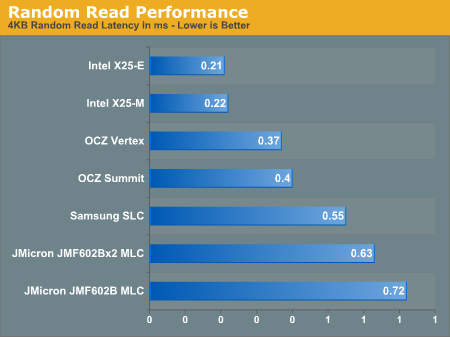The SSD Anthology: Understanding SSDs and New Drives from OCZ
by Anand Lal Shimpi on March 18, 2009 12:00 AM EST- Posted in
- Storage
SSD Aging: Read Speed is Largely Unaffected
Given the nature of the SSD performance-over-time “problem” you’d expect to only pay the performance penalty when writing files, not reading. And for once, I don’t have any weird exceptions to talk about - this is generally the case.
The table below shows sequential read performance for 2MB blocks on new vs. “used” SSDs. I even included data for a couple of the hard drives in the "Used" column; for those numbers I'm simply measuring transfer rates from the slowest parts of the platter:
| 2MB Sequential Read Speed | New | "Used" |
| Intel X25-E | 240.1 MB/s | |
| Intel X25-M | 264.1 MB/s | 230.2 MB/s |
| JMicron JMF602B MLC | 134.7 MB/s | 134.7 MB/s |
| JMicron JMF602Bx2 MLC | 164.1 MB/s | 164.1 MB/s |
| OCZ Summit | 248.6 MB/s | 208.6 MB/s |
| OCZ Vertex | 257.8 MB/s | 250.1 MB/s |
| Samsung SLC | 101.4 MB/s | |
| Seagate Momentus 5400.6 | 77.9 MB/s | - |
| Western Digital Caviar SE16 | 104.6 MB/s | 54.3 MB/s |
| Western Digital VelociRaptor | 118.0 MB/s | 79.2 MB/s |
The best SSDs still transfer data at over 2x the rate of the VelociRaptor.
Read latency is also extremely good on these worn SSDs:

I left the conventional hard drives out of the chart simply because they completely screw up the scale. The VelociRaptor has a latency of 7.2ms in this iometer test with a queue depth of 3 IOs; that's an order of magnitude slower than the slowest SSD here.
Since you only pay the overhead penalty when you go to write to a previously-written block, the performance degradation only really occurs when you’re writing - not when you’re reading.
Now your OS is always writing to your drive, and that’s why we see a performance impact even if you’re just launching applications and opening files and such, but the penalty is much less tangible when it comes to read performance.










250 Comments
View All Comments
Erickffd - Friday, March 20, 2009 - link
Also created an account just to post this comment.Really impressive and well done article ! Will stay tune for further developments and reviews. Thank you so much :)
Also... very impressed by OCZ's respond and commitment upon end users needs and product quality assurance (unfortunately not so commun by large this days among other companies). Certanly will buy from them my next SSDs to reward and support their healty policy.
Be well ! ;)
Gasaraki88 - Friday, March 20, 2009 - link
This truly was a GREAT article. I enjoyed reading it and was very informative. Thank you so much. That's why Anandtech is the best site out there.davidlants - Friday, March 20, 2009 - link
This is one of the best tech articles I have ever read, I created an account just to post this comment. I've been a fan of Anandtech for years and articles like this (and the RV700 article from a while back) show the truly unique perspective and access that Anand has that simply no other tech site can match. GREAT WORK!!!Zak - Friday, March 20, 2009 - link
I just got the Apex. I'd probably cough up more dough for the Vertex after reading this. However, I've run it for two days as my system disk in MacPro and haven't noticed any issues, it's really fast. But I guess I'll get Vertex for my Windows 7 build.Z.
Nemokrad - Friday, March 20, 2009 - link
What I find intriguing about this article is that these smaller manufacturers do not do real world internal testing for these things. They should not need 3rd parties like you to figure this shit out for them. Maybe now OCZ will learn what they need to do for the future.JonasR - Friday, March 20, 2009 - link
Thanks for an excellent article. I have one question does anyone know which controller is beeing used in the new Patriot 256GB V.3 SSD?
tgwgordon - Friday, March 20, 2009 - link
Anyone know if the Vertex Anand used had 32M or 64M cache?Dennis Travis - Friday, March 20, 2009 - link
Excellent and informative article as always Anand. Thanks so much for posting the truth!!IsLNdbOi - Friday, March 20, 2009 - link
Can't remember what page it was, but you showed some charts on the performance of SSDs at their lowest possible performance levels.At their lowest possible performance levels are they still faster than the 300GB Raptor?
Edgemeal - Friday, March 20, 2009 - link
It's too bad Windows and applications don't let you select where all the data that needs to be updated and saved to is stored. If that was an option a SSD could be used to only load data (EXE files and support files) and a HDD could be used to store files that are updated frequently, like a web browser for example, their constantly caching files, from the sound of this article that would kill the performance of a SSD in no time.Great article, I'll stick to HDDs for now.